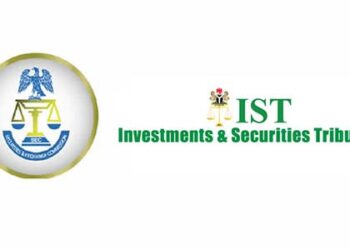Article Summary
- The MB has concluded work to revise its Charter and Memorandum of Understanding (MoU) with the Trustees of the IFRS Foundation.
- The Charter describes the mission and operations of the MB, while the MoU describes the MB’s relationship with the IFRS Foundation.
- The updates to the MoU reflect the formation of the ISSB and other innovations since the agreement of the first MoU in 2009.
The Monitoring Board (MB) has completed revisions to its Charter and Memorandum of Understanding with the IFRS Foundation and set out its 2023-2024 Work Plan.
This was contained in a statement issued by the Board of the International Organization of Securities Commissions (IOSCO) and obtained by Nairametrics.
IOSCO noted that MB welcomed the latest progress made by the IFRS Foundation, which includes the International Sustainability Standards Board’s (ISSB’s) work which is expected to result in the finalization of its first two standards soon.
- “The MB has concluded work to revise its Charter and Memorandum of Understanding (MoU) with the Trustees of the IFRS Foundation.
The Charter describes the mission and operations of the MB, while the MoU describes the MB’s relationship with the IFRS Foundation.
The original versions of these documents were published in 2009. Following the establishment of the ISSB in November 2021, the MB has discussed and agreed to revise the Charter and MoU to add the MB’s new scope of mission and operations, which is to monitor work on the development of sustainability disclosure standards by the ISSB.
The revised documents have been published after being approved by the MB members. The MoU was also renewed between the Monitoring Board and the IFRS Foundation Trustees, signed by the MB Chair Takashi Nagaoka and Erkki Liikanen, Chair of the Trustees in London on May 30,” the statement said.
In a separate statement, the IFRS Foundation Trustees said the updates to the MoU reflect developments in the work of the IFRS Foundation, most notably the establishment of the International Sustainability Standards Board (ISSB) as a sister board to the International Accounting Standards Board (IASB).
It noted that the updates to the MoU reflect the formation of the ISSB and other innovations since the agreement of the first MoU in 2009.
Commenting on the agreement, IFRS Foundation Trustee Chair Erkki Liikanen said:
- “The role of the Monitoring Board is essential to the effective functioning of the IFRS Foundation, and in recent years it has played a vital role in the oversight of the Trustees and the establishment of the ISSB.
- I commend the Monitoring Board for the completion of this agreement on a timely basis and look forward to continuing this relationship into the future”.
Takashi Nagaoka, Chair of the IFRS Foundation Monitoring Board said:
- “With the updated MoU, the Monitoring Board confirms its renewed commitment to ensuring the public accountability of the IFRS Foundation by continuously monitoring and reinforcing the public interest oversight function of the Foundation, as well as promoting the continued development of IFRS Standards as high-quality sets of global accounting standards and global sustainability disclosure standards.
- We look forward to continued collaboration with the Trustees to serve the public interest”.
What you should know
The Monitoring Board was created in 2009 to oversee the IFRS Foundation, whose Trustees in turn exercise oversight over the IASB (International Accounting Standards Board) and the ISSB (International Sustainability Standards Board).
The members of the Monitoring Board are the Board of the International Organization of Securities Commissions (IOSCO), the IOSCO Growth and Emerging Markets Committee, the Financial Services Agency of Japan (JFSA), the European Commission, the US Securities and Exchange Commission (SEC), the Comissão de Valores Mobiliários (CVM) of Brazil, the Financial Services Commission (FSC) of Korea, the Ministry of Finance of the People’s Republic of China and the Financial Conduct Authority (FCA) of the United Kingdom.
The Basel Committee on Banking Supervision is an observer. Through the Monitoring Board, capital markets authorities responsible for setting the form and content of financial reporting in their respective jurisdictions can carry out their mandates regarding investor protection, market integrity, and capital formation.
The IFRS Foundation has a three-tier governance model. The IASB and ISSB are independent standard-setting boards, overseen by a body of Trustees responsible for strategy, funding, and due process oversight of the boards.
The Trustees are in turn publicly accountable to the Monitoring Board of capital market authorities responsible for setting the form and content of corporate reporting in their respective jurisdictions.
The governance arrangements fulfil an essential role in maintaining global confidence in the work of the IFRS Foundation and its standard-setting process—with the role of the Monitoring Board playing a vital role in the governance arrangements.





















